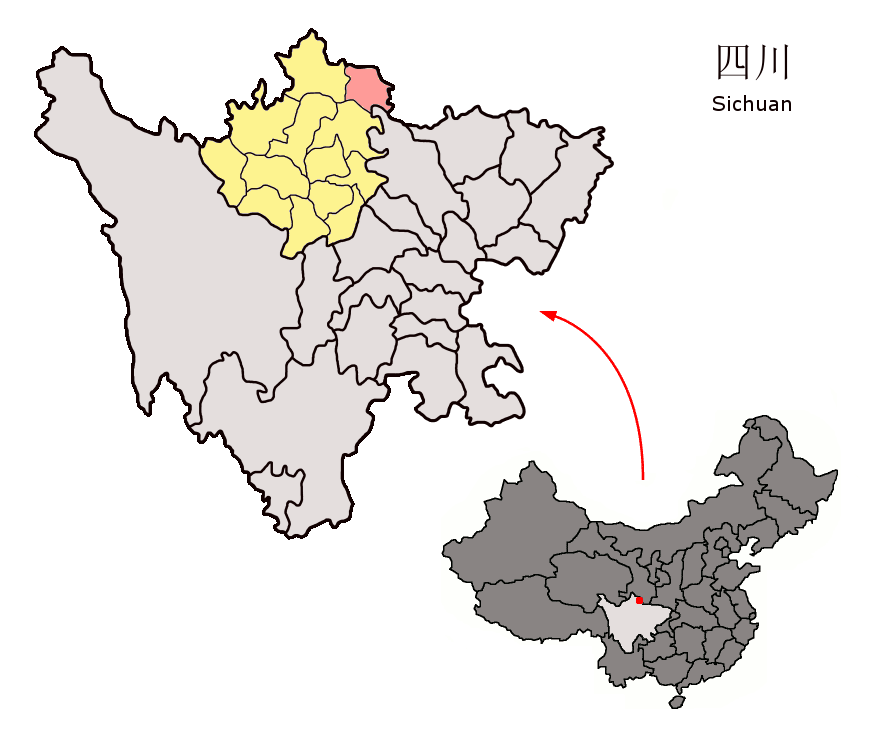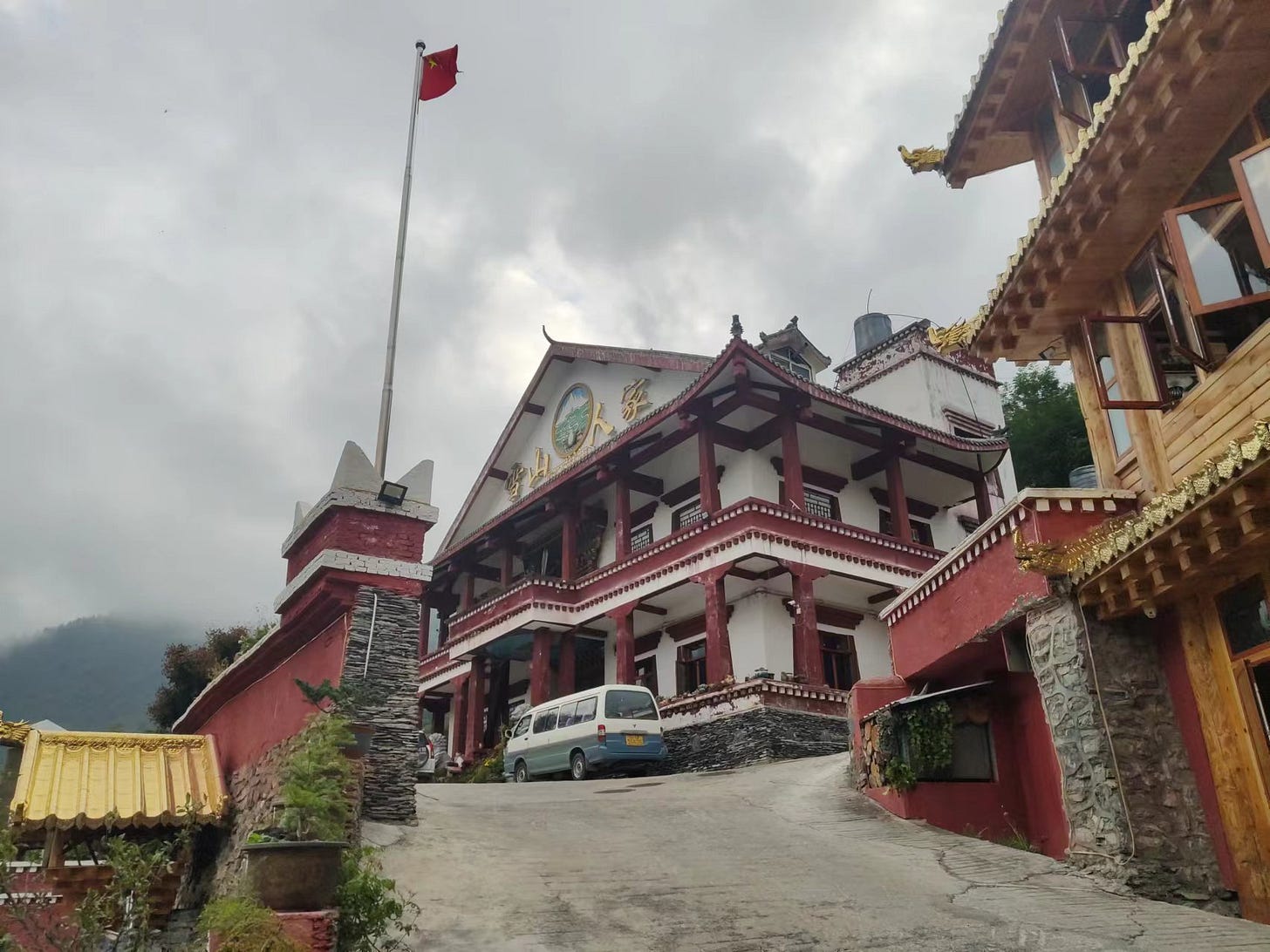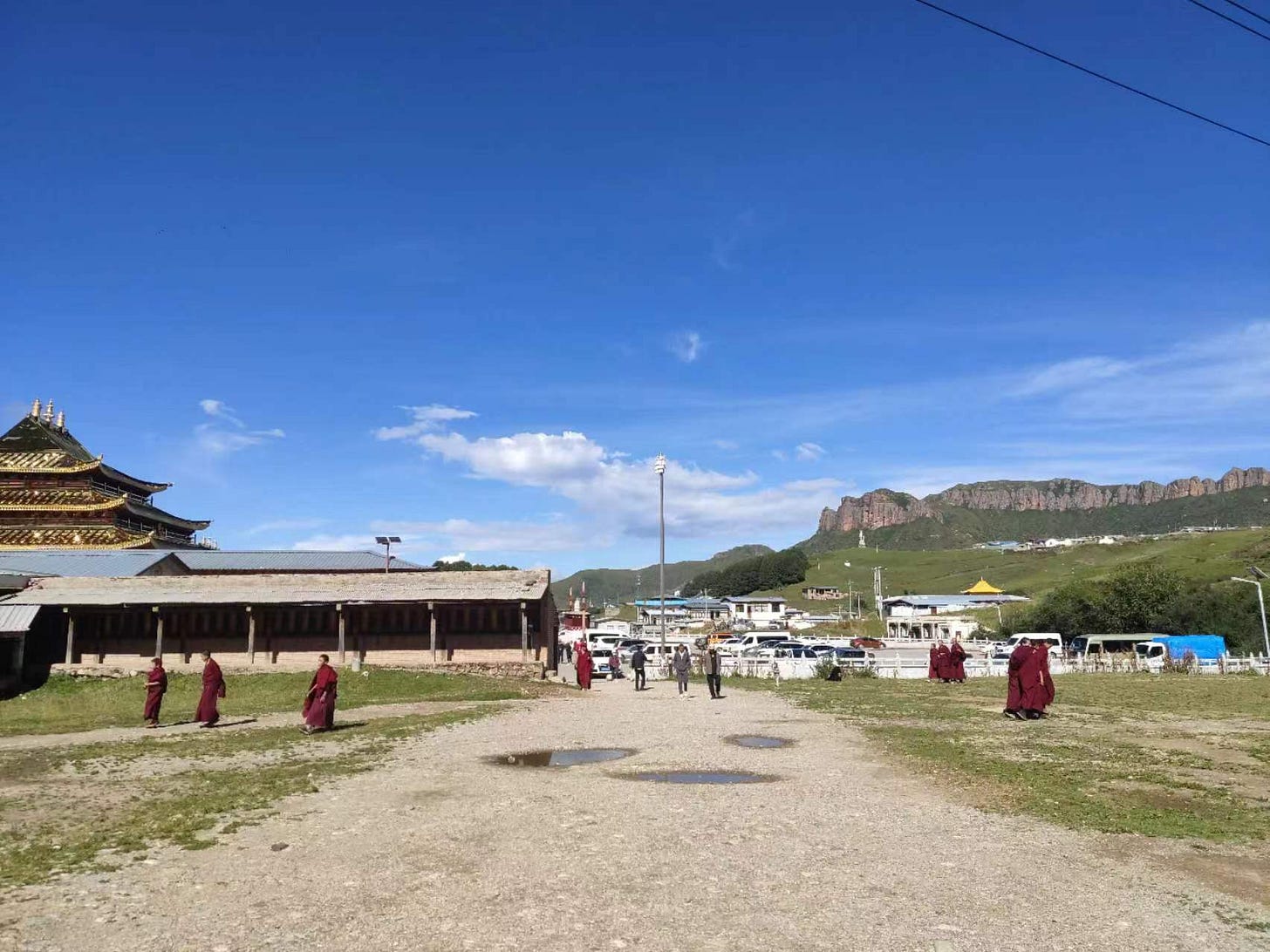Maintaining Tibetan Language and Identity in Jiuzhaigou, Sichuan
This essay continues retracing my October 2024 travels through western China’s Gansu and Sichuan provinces. At the end of my previous travelogue, I drove a mountain road from Zhakarna, in Gannan Tibetan Prefecture, Gansu to Jiuzhaigou, in the Ngawa (Aba) Tibetan and Qiang Autonomous Prefecture in Sichuan. At this stop, we stayed in a family guesthouse in a village near the Jiuzhaigou scenic area, where I had series of illuminating conversations with the guesthouse owner and his family about the state of Tibetan language, culture, and identity in the area.
In Jiuzhaigou, we decided to stay in a family-owned guesthouse a few km away from the scenic area. It was less convenient to get around, but absolutely worth it for a quieter stay. Jiuzhaigou is a massive 5A tourist attration that has huge crowds and is heavily commercialized. The nearby towns are also more built up, but not as much as the main town next to the entrance to the scenic area.

On my first evening, I relaxed in the lobby of the huge guesthouse and chatted to the front desk attendant, a young Tibetan guy (late 20s) who was usually reclined behind the desk, playing on his phone.
I noticed a rack of outfits by the desk.
“Hey..these Tibetan costumes…do you rent them out?”
“No, they’re free. You can take photos with them if you want.”
“Do you or your family ever wear clothes like this?”
“No…these are traditional clothes. They’re expensive to make today…we buy them via a custom order. They were also expensive in history too…regular people wouldn’t wear these.”
“So historically who would wear this? Like rich people…or maybe you’d wear it when you’re getting married?”
“Yes, for a special occasion, a holiday, or maybe worn by someone very wealthy, like a princess, or the daughter of a landlord. They’re not for everyday use.”
I've heard this before - it was very similar to what the Miao ethnic woman told me in Dehang village in western Hunan, more than two years prior.
I responded: “Now everyone can be a princess I guess. I saw some sarcastic reviews online of tourist destinations in places like Yunnan, that said they liked the scenery, except there were too many princesses. I guess they mean too many girls in these kinds of outfits, taking selfies.”
“Haha, yeah, these are very popular with our female guests”
“I feel like asking those girls with their perfect hair and makeup…do you see the local people look like this? Do you feel like a local princess? Look at that local woman herding yak…do you think you look like her?”
“Hah, if she is herding yak, she will have dark skin from the sun, and wear a hat and simple clothing.”
“Yes, and she could probably pick up a yak in her arms and carry it home…up a mountain. I don’t think the tourist princesses can do that.”
“hahaha of course not”
“Do you ever feel it’s inappropriate for Han people to come here and take selfies in Tibetan clothing?”
“No. Why would it be inappropriate?”
“Well, for example, in my country, we have Native Americans, right? You’ve heard of “Indians”, right?”
“Yes”
"In my country, it’s often considered inappropriate for people who are not Native American to wear their clothing. Some people say it's disrespecting a piece of their culture, part of their identity. Or using it as a costume to take pictures is offensive. Can you understand?"
“Oh, I get it. We don’t have that kind of issue. The tourists that like to wear our clothing think it’s beautiful. Of course I’m happy they admire it, that they admire my culture. It doesn't hurt my cultural identity to see someone who is not Tibetan wear our clothing....I have no feeling of threat. If I feel this kind of thing threatens my identity, then my identity is too weak, don’t you think?”
“I don’t know, I am just asking what you think. I don't have this kind of consideration because I am not an ethnic minority."
“I am Tibetan…I have this feeling of identity in my heart, in my bones. You can’t threaten my identity by wearing my clothing. I have this confidence.”
“I see.”
He continues: "But I think an ethnic minority that doesn’t have its own language and writing system will be at risk to be lose its identity. In China we have many ethnic minorities, but most of them don’t have a writing system. I think many of them have some risk because of this, but not Tibetan people".
“Like Qiang people?”
“Yes, like Qiang people…they don’t have their own writing system. Or like Lisu people. They are the 'brother ethnicity' to Tibetans."
[Note: Jiuzhaigou County is part of the Ngawa Tibetan and Qiang Autonomous Region, which also has Qiang ethnic minority villages. There actually IS a Qiang script that has been newly developed as of 2017, but it’s not clear how much it’s promoted or used right now.]
“So...you can speak and read Tibetan?”
“Yes of course. I learned to speak and write Tibetan when I was young”
“On Wechat, I saw your surname is Yang. Is it common for Tibetans to have Han names?”
”Many people do…it’s more convenient for school. I have a Tibetan name too."
“Do guests ever say you don’t look very Tibetan? Because you don’t have an accent when you speak, and you don’t wear cowboy hat, don’t have dark tanned skin? I guess that's their expectation.”
”Yes, all the time. These questions annoy me. Tibetan people don't look the same!”
“I understand. I’m American, but I have a lot of Chinese people who tell me I don’t look American, because they think Americans all have blonde hair and blue eyes”
“Hah, of course not. We have many tourists here, and I see Americans with every appearance...”
“By the way, can the next generation of kids here speak Tibetan?”
He thinks about it for a second. “If they go to school in Jiuzhaigou, then they can definitely speak Tibetan, because they will speak it at home, and with their friends at school. And the school has Tibetan class. But many families send their kids away to school in Chengdu, where the schools are better. If they go there, they will mostly speak Mandarin with their friends, and can't learn Tibetan class in school, so their Tibetan will be weak.”
“They would only use it when they come home for holidays I guess?”
“Right. They speak Tibetan with their families. But actually many families also hope their children will learn Mandarin well, because it’s better for their future. They can speak Tibetan with their grandparents.”
“Do the elders here not speak Mandarin?”
“Oh actually they do. Our area is a little different compared to other Tibetan regions…we encountered people speaking Mandarin earlier…from time of the sent-down educated youth (知青下乡) Our grandparents’ generation started learning Mandarin at that time, so they can speak it now. But in places like Xinjiang and Tibet, a lot of ethnic minority people still can’t speak it.”
“Oh…sent-down youth. So I guess that was in the 60s or 70s, during the Cultural Revolution. That makes sense…your grandparents would have been kids during that time. That period was so crazy.”
“Yes…Cultural Revolution. Actually, I don’t know how it was at that time. Our parents don’t remember either…they were children. I heard it was very messy (乱) but not here…more in the city. But that’s why we can speak Mandarin... because of those educated youth who taught in schools.”
“I encountered Tibetans who didn’t speak Mandarin in Gannan, in Gansu province, even fairly young people”
“Gannan…this region developed relatively late. Even now the economy there is not good. And the people are more traditional. So, their Mandarin language ability is also less developed.”
“What around writing? Can kids here write Tibetan?”
“If they study it in Tibetan class in school. Or you can go to the monastery school. You need Tibetan script to read Buddhist scriptures, so they will learn it in the monastery. That's common in Langmu Temple where you just came from.”
“Last year when I traveled in Yunnan, I heard something similar in the Dai ethnic area…in Xishuangbanna. They told me kids only have the chance to learn the Dai script if they go to become monks. I saw some children in Langmu Temple who were training to become monks.” [link to my travelogue from Xishuangbanna, which coincidentally also featured a discussion of the impact of the sent-down educated youth]
“Yes, it’s common in that area to send one child to the monastery when he is young. This can bring blessings to the family and also reduces the burden on the parents” “But it’s not for life, right? They don’t have to be monks forever?"
“That’s right, it’s like school. When they are 18, they can do whatever they want”
“Is Tibetan culture very strong in Jiuzhaigou County? I saw some statistics that Tibetan people are only about 1/3rd of the county’s population.”
“It depends on where you go. There are more Han people in the county seat. But the villages over here in the scenic area are almost 100% Tibetan people, so the Tibetan culture is stronger. When my uncle is back, you can ask him to take a tour of his house. It’s the big building next to the guesthouse. It’s very beautiful inside, with traditional Tibetan decorations. He's very happy to show it to guests.”
“Really? Okay I will”
"Also, if you have time, you can hike up the mountain trail behind the guesthouse. After about 10 minutes, you'll reach the old village. We moved down here many years ago, but some of the elders prefer to stay up there to plant fields. You can see the traditional lifestyle"
"Wow really? I guess the houses are in bad shape now?"
"No. During Covid when we had few guests, many families were bored so they went back up to the village and fixed up the old houses. You can go see tomorrow morning."
"Okay I will! Thanks!"
...to be continued next time, when I went up the mountain trail to see the old village the next day!


